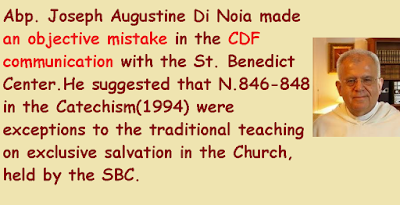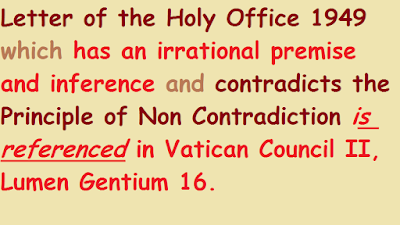The Letter of the Holy Office 1949 can be read with the Feeneyite-Cushingite model. It can be read with the red passages not being exceptions to the blue passages ( Feeneyism) or with the red passages being exceptions to the blue passages (Cushingism). The blue passages are orthodox and support the dogma extra ecclesiam nulla salus as it was known to the Magisterium in the 16th century.
Archbishops Giacomo Morandi and Joseph Augustine di Noia, Secretary and Adjunct Secretary of the Congregation for the Doctrince of the Faith, Vatican are reading the Letter of the Holy Office 1949 with the red passages being an exception to the blue passages.

This is irrational, non traditional and heretical.

This is irrational, non traditional and heretical.

This is the same error they make in the interpretation of Vatican Council II, the Catechism of the Catholic Church, Dominus Iesus etc. It is only with this ruse that there is a rupture with Tradition ; the dogma extra ecclesiam nulla salus, the past exclusive ecclesiology, the Syllabus of Errors, an ecumenism of return, traditional mission etc.


They are not enforcing the error legally upon Brother Andre Marie MICM, the Prior at the St. Benedict Center, New Hampshire, USA, in the Diocese of Manchester.

Also religious communities in the Catholic Church are being forced to accept this error or they will be threathened with Prohibitions, as has been placed on the Slaves of the Immaculate Heart of Mary at the St. Benedict Center.




Also religious communities in the Catholic Church are being forced to accept this error or they will be threathened with Prohibitions, as has been placed on the Slaves of the Immaculate Heart of Mary at the St. Benedict Center.



LETTER OF THE HOLY OFFICE 1949
We are bound by divine and Catholic faith to believe all those
things which are contained in the word of God, whether it be
Scripture or Tradition, and are proposed by the Church to be
believed as divinely revealed, not only through solemn
judgment but also through the ordinary and universal teaching
office (, n. 1792).
Now, among those things which the Church has always
preached and will never cease to preach is contained
also that infallible statement by which we are taught that there
is no salvation outside the Church...
things which are contained in the word of God, whether it be
Scripture or Tradition, and are proposed by the Church to be
believed as divinely revealed, not only through solemn
judgment but also through the ordinary and universal teaching
office (
Now, among those things which the Church has always
preached and will never cease to preach is contained
also that infallible statement by which we are taught that there
is no salvation outside the Church...
Therefore, no one will be saved who, knowing the Church
to have been divinely established by Christ, nevertheless
refuses to submit to the Church or withholds obedience
from the Roman Pontiff, the Vicar of Christ on earth...
to have been divinely established by Christ, nevertheless
refuses to submit to the Church or withholds obedience
from the Roman Pontiff, the Vicar of Christ on earth...
In His infinite mercy God has willed that the effects,
necessary for one to be saved, of those helps to salvation
which are directed toward man's final end, not by intrinsic
necessity, but only by divine institution, can also be
obtained in certain circumstances when those helps are
used only in desire and longing.
necessary for one to be saved, of those helps to salvation
which are directed toward man's final end, not by intrinsic
necessity, but only by divine institution, can also be
obtained in certain circumstances when those helps are
used only in desire and longing.
Therefore,
that one may obtain eternal salvation, it is not always
required that he be incorporated into the Church actually
as a member, but it is necessary that at least he be
united to her by desire and longing.
However, this desire need not always be explicit,
as it is in catechumens; but when a person is involved
in invincible ignorance God accepts also an implicit desire,
so called because it is included in that good disposition
of soul whereby a person wishes his will to be conformed
to the will of God.
that one may obtain eternal salvation, it is not always
required that he be incorporated into the Church actually
as a member, but it is necessary that at least he be
united to her by desire and longing.
However, this desire need not always be explicit,
as it is in catechumens; but when a person is involved
in invincible ignorance God accepts also an implicit desire,
so called because it is included in that good disposition
of soul whereby a person wishes his will to be conformed
to the will of God.
Discussing the members of which the Mystical Body is
-composed here on earth, the same august Pontiff says:
"Actually only those are to be included as members of
the Church who have been baptized and profess the true
faith, and who have not been so unfortunate as
to separate themselves from the unity of the Body, or
been excluded by legitimate authority for grave faults
committed."
Toward the end of this same encyclical letter, when
most affectionately inviting to unity those who do
not belong to the body of the Catholic Church, he
mentions those who "are related to the Mystical Body
of the Redeemer by a certain unconscious yearning
and desire," and these he by no means excludes
from eternal salvation, but on the other hand states
that they are in a condition "in which they cannot
be sure of their salvation" since "they still remain
deprived of those many heavenly gifts and helps
which can only be enjoyed in the Catholic Church"
(AAS, 1. c., p. 243). With these wise words he reproves
both those who exclude from eternal salvation all united
to the Church only by implicit desire,...
It is necessary that the desire by which one is related
to the Church be animated by perfect charity.
_________________________________
-Lionel Andrades
FEBRUARY 3, 2019
The Letter of the Holy Office 1949 can be read with the Feeneyite-Cushingite model. It can be read with the red passages not being exceptions to the blue passages ( Feeneyism) or with the red passages being exceptions to the blue passages (Cushingism). The blue passages are orthodox and support the dogma extra ecclesiam nulla salus as it was known to the Magisterium in the 16th century.
https://eucharistandmission.blogspot.com/2019/02/the-letter-of-holy-office-1949-can-be.html

https://catholicism.org/letter-explaining-saint-benedict-centers-doctrinal-stance.html

JANUARY 28, 2019
In Magisterial documents the red is not an exception to the blue, the red does not contradict the blue : with the blue there is a hermeneutic of continuity with Tradition (16th- century extra ecclesium nulla salus, the Syllabus of Errors, ecumenism of return, past exclusivist ecclesiology etc)
https://eucharistandmission.blogspot.com/2019/01/in-magisterial-documents-red-is-not.html


























